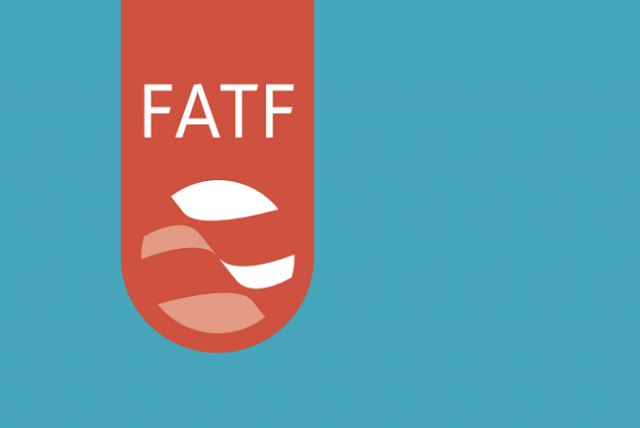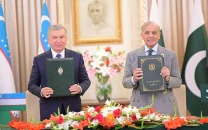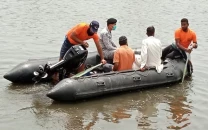FATF-related bill goes to Senate after NA approval
ATA bill proposes spying powers for investigators; bill against ‘intentional ridiculing of armed forces’ moved

The National Assembly on Tuesday passed a bill that allowed spying powers to the investigators while probing into the case of terror financing, as part of the government’s efforts to enact legislation to help the country get out of the grey list of the Financial Action Task Force (FATF).
Soon after the passage from the lower house of parliament, the anti-terrorism bill was introduced in the opposition-dominated Senate. The chair referred the bill to the relevant committee despite the objections raised by Senator Raza Rabbani of the Pakistan Peoples Party (PPP).
The Anti-Terrorism (Third Amendment) Bill, 2020, was moved in the National Assembly by the ruling Pakistan Tehreek-e-Insaf lawmaker from Karachi Faheem Khan, which aimed at addressing the issue of terror financing.
The bill seeks insertion of Section 19-C in the Anti-Terrorism Act (ATA) relating to application of investigation techniques. If becomes law, the bill gives spying powers to the investigators and allows them to conduct undercover operation, intercept communication and access computer systems.
“The investigating officer may with the permission of court within sixty days of such permission use techniques including undercover operation, intercepting communications, accessing computer system and controlling delivery for investigation of financing of terrorism under the law in force,” it said.
“The aforementioned period of sixty days may be extended upto further period of sixty days by the court on a request made to it in writing. The court may grant extension if it is satisfied on the basis of situation/reasons given in the written request. The provisions of this sub-section shall be addition to and not in derogation of another law for the time being in force,” it added.
According to the statement of objectives, terror financing was one of the major obstacles which had not only been playing a degrading role against the development of the country but also empowered such elements with financial means which were an ultimate threat to peace in the country.
It added that the genuine purpose behind the introduction of the bill was to enable the law-enforcement authorities through the insertion of section 19-C to take certain encountering techniques with an authoritative support of the courts of law to curb terror financing.
Meanwhile, PTI lawmaker from Mianwali Amjid Ali Khan tabled another bill to amend the Pakistan Penal Code (PPC) and the Criminal Procedure Code (CrPC) to prevent “hatred” and “disrespectful behaviour” towards the country’s armed forces.
Through the bill, the PTI lawmaker sought insertion of Section 500-A in the PPC, which related to intentional ridiculing of the armed forces etc, and the Schedule 2 of the CrPC, which dealt with the punishment for intentional ridiculing of the armed forces etc.
The proposed amendment stated that “whosoever intentionally ridicules, brings into disrespect or defames the Armed Forces of Pakistan or a member thereof, he shall be guilty of an offence punishable with imprisonment for a term which may extend to two years, or with fine which may extend to five hundred thousand rupees, or with both.”
At present, the Section 500 of the PPC describes punishment for defamation but lacks specific reference to the armed forces. It states: “whoever defames another shall be punished with simple imprisonment for a term which may extend to two years, or with fine, or with both.”
The statement of the objective of the bill said that the purpose of the amendment was to prevent hatred and disrespectful behaviour towards the armed forces. “Strict action should be taken against those bringing disrepute to the Armed Forces institution in accordance with the law.”
With the insertion of the new section, the government appeared to be drawing official ‘red lines’ for the contents posted on social media platforms. In 2017, the then Interior Minister Chaudhry Nisar Ali Khan had directed the Federal Investigation Agency's (FIA) Cyber Crime Wing to take action against “those ridiculing the army on social media” in order to protect “the prestige, reputation and goodwill” of the armed forces.
Motorway gang rape
Meanwhile, lawmakers from both sides continued the debate for the second day on the motorway gang rape case. Maulana Akbar Chitrali opposed castration of the rapists, questioning what would happen if a woman raped a man.
In his speech, Science and Technology Minister Fawad Chaudhry questioned if public hanging would prove to be an effective deterrence as roughly 5,000 such cases annually emerge in Pakistan. Hina Rabbani Khar of the PPP stressed the implementation of laws and making the system work.
PTI’s Riaz Fatyana suggested that there should be a ‘one-button’ app, installed in the mobile phones used by women, which could immediately share her location with the law enforcement personnel in case of emergency situation.
Senate session
The Senate session also suspended the routine proceedings after the Question Hour and took up the motorway gang rape tragedy for discussion. During the debate, the lawmakers demanded public execution of the culprits and removal of the Lahore capital city police officer (CCPO).
Leader of the House Shehzad Waseem said that the motorway incident was a tragedy. In the past, added, the police were used for political purposes. He condemned the controversial remarks of the Lahore CCPO after the gang rape incident.
Opposition Leader Raja Zafarul Haq asked why such tragic incidents were taking place all over Pakistan. “People don’t trust the system. Things are getting worse with each passing day,” he said, calling for changing the “police culture”.
PPP Senator Rehman Malik said that the motorway should not have been reopened until all facilities were available. He also demanded special legislation regarding rape cases. Federal Minister Azam Swati stressed the need for a law to allow decision of such cases in 30 days.
Senator Sirajul Haq of the Jamaat-e-Islami (JI) lamented that the culprits were still roaming free despite the passage of 122 hours. Another JI senator, Mushtaq Ahmad, said: “Six police chiefs have been changed in Punjab in two years but the law and order situation has not improved.
Meanwhile, the chairman gave his ruling on a statement of the water resources ministry regarding the construction of Kalabagh and Akori dams. “Kalabagh Dam cannot be built unless all the four provinces agree,” he said. National-level Matters should be decided by the Council of Common Interests (CCI).



















COMMENTS
Comments are moderated and generally will be posted if they are on-topic and not abusive.
For more information, please see our Comments FAQ